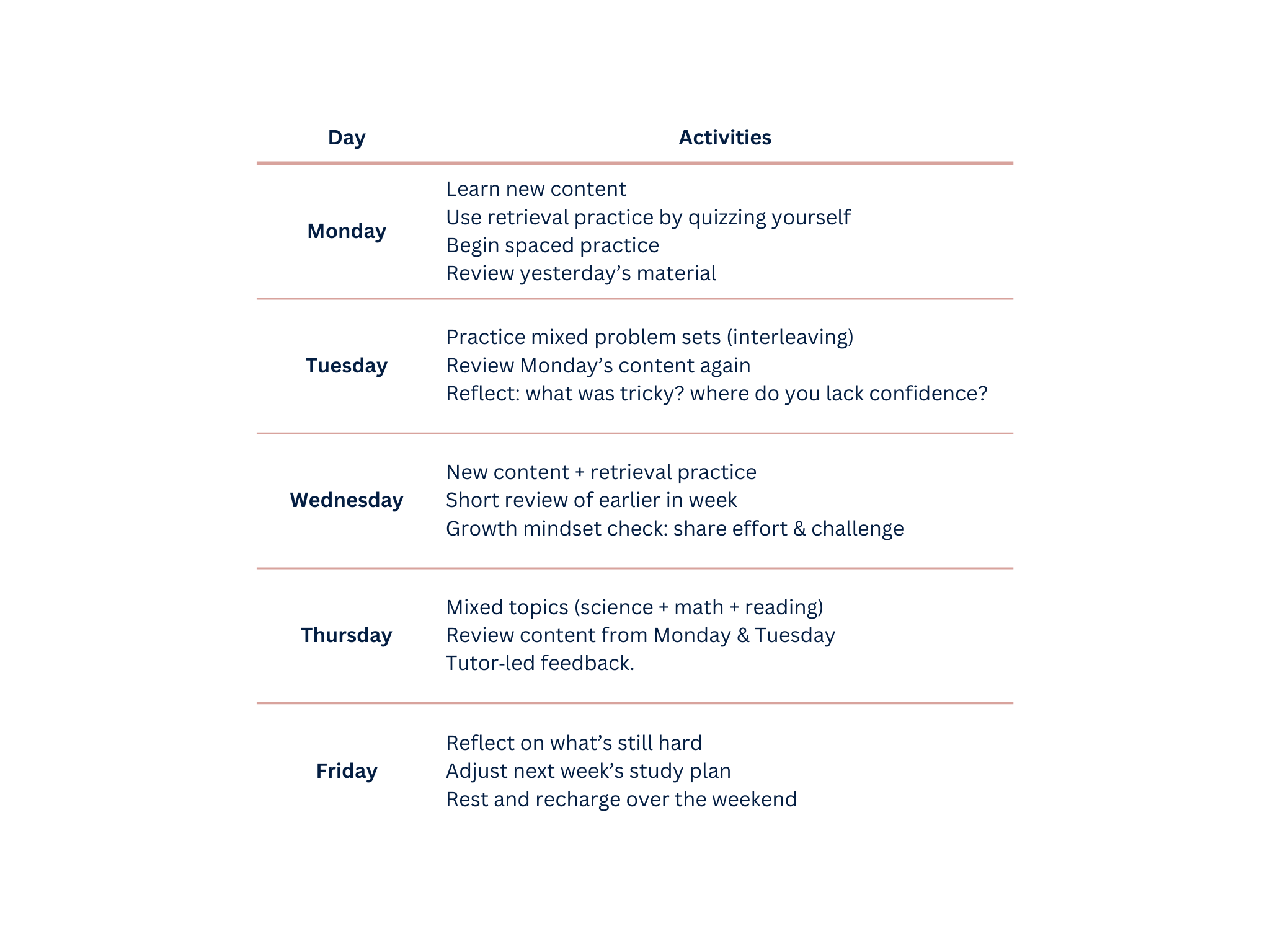5 Study Habits That Help Kids Not Just Catch Up, But Leap Ahead
As a parent, it’s not just about helping your child catch up; it’s about setting them up to thrive. These five evidence based study habits go beyond remediation. They help build confidence, deepen understanding, and unlock long‑term success. At TutorMe, we believe in helping every student move from getting by to getting ahead.
1. Practice Active Retrieval. Don’t Just Re‑Read.
One of the most powerful things students can do is try to recall material from memory, rather than just reading or highlighting. This is called retrieval practice or the “testing effect.” When kids quiz themselves (flashcards, self‑test questions, reciting what they remember) they strengthen neural pathways, making recall easier and more reliable later.
How to use it:
After a lesson, close the book and try to write or say as much as you remember.
Use practice quizzes or test prep questions.
Use flashcards with the question on one side, answer on the other.
2. Spread It Out. Spaced Practice Over Time.
Studying in many shorter sessions over several days or weeks beats marathon sessions at the last minute. This is called spaced practice (or spaced repetition). It combats forgetting and helps the brain consolidate what’s learned.
How to use it:
Break up studying into shorter slots spread over days. For instance, review material today, then again tomorrow, then several days later.
Use a planner or schedule: small, regular reviews of prior lessons even while learning new ones.
Flashcards or digital tools that re‑show material when you’re beginning to forget (rather than when you still feel very confident).
3. Mix It Up .
Instead of practicing one topic until mastery then moving to the next (a blocked approach), interleaving means mixing practice of different but related topics or problem types. It’s harder, sometimes feels less satisfying in the moment, but it boosts flexibility and long‑term mastery.
How to use it:
If studying math, alternate among different kinds of problems (ie. algebra, geometry, word problems) rather than doing all of one kind first.
For reading or science, study multiple topics in the same session, then circle back later.
Use mixed homework sets / problem banks.
4. Embrace a Growth Mindset.
Believing that intelligence and ability can improve with effort makes a huge difference. When kids see challenges as opportunities, not obstacles, they’re more willing to stretch, make mistakes, and learn from them. This mindset supports all the other habits above.
How to use it:
Praise effort, strategy, persistence, not just results. (“Look how hard you worked on that hard problem,” rather than “You’re so smart.”)
When mistakes happen, analyze them: What went wrong? What will you try differently next time?
Model growth mindset: as parents or tutors, share stories of setbacks and improvement.
5. Reflect, Adjust, and Monitor Progress.
To leap ahead, it’s not enough to just do the right habits; it’s important to check what’s working, where gaps remain, and adjust accordingly.
How to use it:
Keep short progress checks: every week or two, review what content is sticking and what isn’t.
Use quizzes or tutor-led check‑ins to spot weak spots.
Encourage students to self‑reflect: “Which problems were hardest? What strategies helped me learn best?”
Update learning plan: maybe more spaced practice in some areas, or more interleaving elsewhere.
Putting It All Together:
A Sample Weekly Strategy
Here’s a mock‑schedule of how these habits might work in a week for a student prepping for a science test:
Conclusion
When students, parents, and tutors commit to more than just catching up. When they build habits that emphasize active recall, distributed learning, varied practice, growth mindset, and ongoing reflection, learning becomes deeper, more durable, and more joyful.
At TutorMe, that’s what we aim for: not just helping kids avoid falling behind, but helping them soar ahead.

